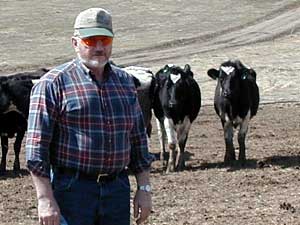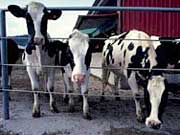|
Audio
Photos
Resources
Your Voice
|
The debate over farm expansion gets personal
April 15, 2003
 |
| Dan French is a dairy farmer and longtime Land Stewardship Project member. He says he hopes to grow his herd of 180 cows. But he says its a matter of how. (MPR Photo/Erin Galbally) |
Rochester, Minn. — For two years, Evan Schmeling says he heard rumors about plans for a big dairy about a half-mile down his tiny county road. "Hearsay mostly, and nobody knew if it was true or not. The rumors just kept getting louder and louder , and we finally realized it was something that was proposed," says Schmeling.
That was a large-scale dairy operation with more than 2,000 cows. If it goes up, it will be one Schmeling's closest neighbors. Evan Schmeling's crop farm is in a stretch of flat rich land in rural Dodge County. He's nearing retirement after 30 years in the field.
Schmeling used to raise hogs, but low prices drove him out of livestock more than a decade ago. He says he respects his neighbors who continue to raise animals. But he was worried about such a big dairy operation. The farm would not be owned by anyone in the community, but by a businessman from the East Coast.
 | |||
Schmeling says he doesn't like to see a day when a farmer is not his own boss.
"This looks like we're changing the way we farm out here, and the fact that farmers aren't going to have much to do of their own any more," Schmeling says. "It's changing ownership of the land, animals and equipment. It's like we're becoming a bunch of laborers out here."
Schmeling says he talked with neighbors and found out that others shared his opposition. People are worried about the smell, and possible contamination of drinking water. Some also expressed concern the big dairy would affect milk prices through overproduction.
So Evan Schemling picked up the phone and called the Land Stewardship Project. The group has stopped more than 20 large-scale animal operations over the past two decades. In the last few years the group has taken at least two of those cases to court.
The Land Stewardship Project's tactics include circulating petitions, pushing for new zoning and even lobbying up in St. Paul. Mark Schultz heads the group's policy and organizing program.
 | |||
"Typically, an organizer from LSP will go and meet in the community with 10 or 20 residents in the community that are farmers and long-time rural residents. And they start talking about what this means to their community," says Schultz. "What they're looking to us for is ... what options to do we have, and can we raise our concerns in a way that they'll be heard."
Schultz says the process encourages people to take advantage of their rights. He says it's about democracy.
"The majority of people don't want large-scale factory farms, whether they live in rural Dodge County or Lac Qui Parle County or Renville County. So we respond to people when they make the call, and that's really what our organizing is about," says Schultz.
The Land Stewardship Project's organizing work is also controversial. Just ask members of the Southeast Minnesota Ag Alliance. The group recently held its annual meeting in Rochester. Families who run large-scale farming operations from around the region filled a hotel banquet room.
Many have first-hand knowledge of the Land Stewardship Project from courtroom battles and feedlot fights. Others say they anticipate a time when a planned livestock expansion will push them to the front lines.
 | |||
Mark and Donna Monenning say they fit into the second category. They operate a beef and hog operation in rural Dodge County, with plans to expand one day. Not too long ago, the couple says they came under fire in their community for defending a large dairy proposal.
Donna Monenning says restrictions governing agriculture just don't make sense.
"What other business is told they can't grow? What other institution or organization? Why is it that growth is so awful for a livestock family to want to pursue?" Monenning asks. "Is the Mayo Clinic told they can't grow? Is IBM told they can't grow? Growth is good. Why not for livestock family farmers?"
Monenning and other members of the Southeast Minnesota Ag Alliance want to streamline the approval process for large dairy expansions. They want the Department of Agriculture and the Minnesota Pollution Control Agency to have greater control. Donna Monenning says neighbors shouldn't be able to keep each other from expanding livestock operations.
Minnesota Agriculture Commissioner Gene Hugoson is also a critic of the Land Stewardship Project. Hugoson favors policies that encourage growth in agribusiness. In many cases, that means farms get bigger.
At a dairy conference in St. Cloud, Hugoson said Land Stewardship ideas are too rooted in the past.
|
I want to keep growing. I need to keep my business viable. I want my neighbors to do that. But at the same time ... we can't hide behind rules that were for farming 30 years ago. We have to take responsibility for what we're doing now and be better neighbors.
- Dairy farmer Dan French |
"My concern with some of the approaches of the Land Stewardship is that it could be counter-productive. They're looking to preserve a particular style of farming, a particular size of farming," says Hugoson. "It's getting to the point where no one has the ability to expand any type of livestock operation."
Hugoson warns that if the Land Stewardship Project is successful, livestock farming will leave the state in favor of South America. He says that would have major repercussions for corn and soybean farmers, and he warns rural communities will suffer the consequences.
"What we see now is low grain prices and the depopulation of the rural communities, which are a result of policies promoted by commissioner Hugoson and others," the Land Stewardship Project's Mark Schultz responds. "What we're talking about is more people, better prices, a more prosperous rural environment and a better cared for landscape."
That mission has attracted about 1,600 Minnesota families to join the Land Stewardship Project. Many are rural residents and farmers. The majority sell their milk or hogs to companies like Hormel or Land O Lakes.
The Land Stewardship survives on a shoestring budget. It cobbles together private donations and government funding. The organization even gets grants from places like the Catholic Campaign for Human Development and Farm Aid.
Dan French is a dairy farmer and a longtime Land Stewardship Project member. He farms just outside of Mantorville. He and his neighbors make up 80 percent of Dodge County's dairy industry.
Farmers have lots of disagreements about how they operate. But one thing they agree on is the need to expand. Even Dan French feels that way, but he wants to do it differently.
"I'm a farmer. I want to keep growing. I need to keep my business viable. I want my neighbors to do that. But at the same time I think we have to take more responsibility," says French. "We can't hide behind rules that were for farming 30 years ago. We have to take responsibility for what we're doing now and be better neighbors."
French says that means guarding against smell and manure runoff, and protecting the groundwater. Neighbors need to take each other's concerns seriously. He says the Land Stewardship Project is leading that cause, and he predicts even if the organization disappears, the ideas behind it won't.
|
News Headlines
|
Related Subjects
|

